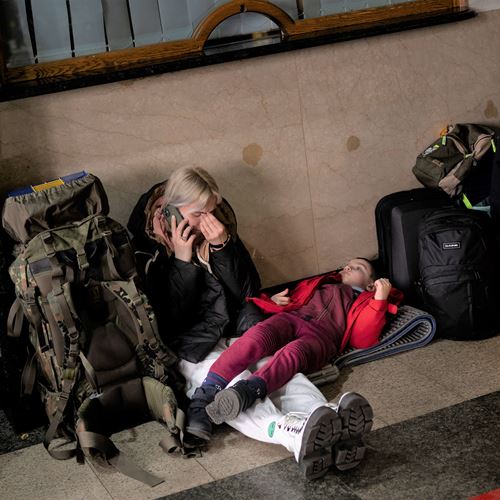In a unanimous agreement at the EU Council meeting yesterday, Member States activated the directive for the temporary protection of refugees fleeing the conflict in Ukraine for the first time since it was agreed upon 21 years ago. The agreement will ensure immediate protection for people fleeing from Ukraine and will help prevent overburdened asylum systems in the receiving hosts countries.
DRC welcomes the activation of the Temporary Protection Directive, as it will aim to ensure fast and effective protection, and DRC calls upon all EU Member States to immediately step up their capacity to receive people that have been forced to leave Ukraine. Access to safety and protection for all those fleeing the conflict, regardless of their origin or nationality, should however be ensured. Reports of discriminatory practices vis-à-vis people seeking to escape the conflict is alarming.
“The activation of the directive is a timely response to the extraordinary situation and will help ensure an adequate reception of those fleeing the conflict. With the non-inclusive scope of the directive, we encourage states to apply it generously and to ensure access to safety and protection for everyone fleeing the conflict, regardless of their origin or nationality,” DRC Secretary General Charlotte Slente stated on its announcement.
While displacement across borders is mounting and must be addressed, assistance to those who cannot or choose not to leave Ukraine is critical, and the need for establishing humanitarian corridors immediately is essential. DRC strongly supports the call by the UN Secretary General to ensure that International Humanitarian and Human Rights Law and the protection of civilians is upheld, and to enable the delivery of rapid, unhindered and principled humanitarian assistance to those, and for those affected by the conflict.
DRC Danish Refugee Council’s Secretary General, Charlotte Slente highlighted this, stating: “It is imperative that the prohibition of the use of banned weapons, such as cluster munitions, as well indiscriminate attacks on civilians and civilian infrastructure are respected; and that the use of explosive weapons in populated areas is avoided at all costs. It is unconscionable in all situations, but especially one such as this in a highly urbanised environment”.
“We must find ways to scale up humanitarian assistance to the affected population in Ukraine, ensuring an adequate number of safe corridors for the access of humanitarian services to reach civilians, as well as for civilians to evacuate conflict areas”.
DRC is concerned about the fact that increasing number of civilians are at immediate risk or already lost access to humanitarian aid, along the contact line, in and around major cities, but also within the “Non-Government Controlled Areas (NGCA)”. There are reasons to assume that needs in these areas are increasing, while provision of aid will be difficult or impossible. DRC therefore also calls for humanitarian access in the NGCA to provide needs-based assistance.
With more than one million already displaced across borders and untold numbers inside the country, with many more expected in the coming days and weeks, the quick efforts by the EU Member States to provide timely and adequate protection for those fleeing Ukraine shows that timely, collective, and humane response to a refugee crisis is possible when there is political will. It is essential that such political will also apply to the humanitarian response inside Ukraine.
